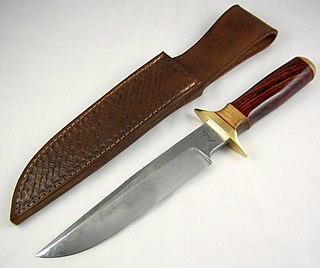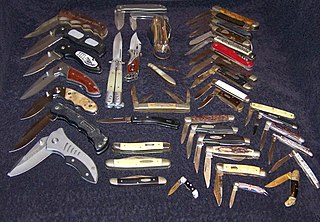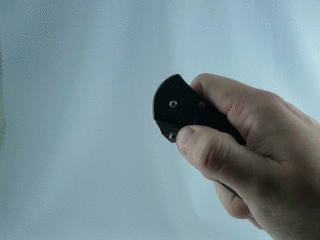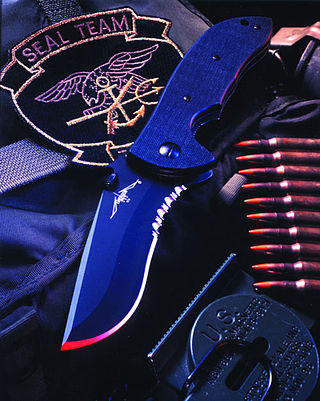
A knife is a tool or weapon with a cutting edge or blade, usually attached to a handle or hilt. One of the earliest tools used by humanity, knives appeared at least 2.5 million years ago, as evidenced by the Oldowan tools. Originally made of wood, bone, and stone, over the centuries, in step with improvements in both metallurgy and manufacturing, knife blades have been made from copper, bronze, iron, steel, ceramic, and titanium. Most modern knives have either fixed or folding blades; blade patterns and styles vary by maker and country of origin.

Leatherman is an American brand of multi-tool made by Leatherman Tool Group of Portland, Oregon. The company was founded in July 1983 by Timothy S. Leatherman and Steve Berliner in order to market the former's idea of a capable, easily portable hand tool with multiple functions. That same year, Leatherman Tool Group sold its first Multi-Tool, which was called the PST.

A switchblade is a pocketknife with a sliding or pivoting blade contained in the handle which is extended automatically by a spring when a button, lever, or switch on the handle or bolster is activated. Virtually all switchblades incorporate a locking blade, where the blade is locked against accidental closure when the blade is in the open position. It is unlocked by a mechanism that allows the blade to be folded and locked in the closed position.

The Benchmade Knife Company is an American knife manufacturer based out of Oregon City, Oregon.

A pocketknife is a knife with one or more blades that fold into the handle. They are also known as jackknives (jack-knife), folding knives, EDC knife, or may be referred to as a penknife, though a penknife may also be a specific kind of pocketknife. A typical blade length is 5 to 15 centimetres.
A gravity knife is a knife with a blade contained in its handle, which opens its blade through the force of gravity. This mechanism of opening is fundamentally different from the switchblade, which extends its spring-propelled blade automatically upon the push of a button, switch, or fulcrum lever. The main purpose of gravity opening is that it allows opening and closing to be done with one hand, in situations where the other hand is occupied. Hence, historically they have been issued to parachutists to cut off caught lines, such as lines tangled in trees, a major potential use of the gravity knife.

The Opinel company has manufactured and marketed a line of eponymous wooden-handled knives since 1890 from its headquarters in Saint-Jean-de-Maurienne, Savoie, France where the family-run company also operates a museum dedicated to its knives. The company sells approximately 15 million knives annually. Opinel knives are made of both high carbon and stainless steel, the latter being Sandvik steel from Sweden.

Buck Knives is an American knife brand and manufacturer founded in Mountain Home, Idaho and now located in Post Falls, Idaho. The company has a long history through five generations of the Buck family from 1902 to the present day. Buck Knives primarily manufactures sport and field knives and is credited with inventing the "folding hunting knife" and popularizing it to such a degree that the term "buck knife" has become associated with folding lockback knives, including those made by other manufacturers.
Spyderco is an American cutlery company based in Golden, Colorado, producing knives and knife sharpeners. Spyderco pioneered many features that are now common in folding knives, including the pocket clip, serrations, and the opening hole. Spyderco has collaborated with 30 custom knife makers, athletes, and self-defense instructors for designs and innovated the usage of 20 different blade materials.

Gerber Legendary Blades is an American maker of knives, multitools, and other tools for outdoors and military headquartered in Portland, Oregon. Gerber is owned by the Finnish outdoors products company Fiskars. Gerber was established in 1939 by Pete Gerber.

An assisted-opening knife is a type of folding knife which uses an internal mechanism to finish the opening of the blade once the user has partially opened it using a flipper or thumbstud attached to the blade.

Christopher Stanley Reeve is a South African-American knife maker, recognized as one of the most influential people in knife making history. Reeve founded Chris Reeve Knives (CRK) in 1984. In 2014, Reeve retired and was inducted into the Blade Magazine Hall of Fame in 2015.

Ken Onion is an American custom knifemaker based in Kaneohe, Hawaii, United States who invented the "SpeedSafe" assisted opening mechanism for Kershaw Knives. Ken Onion was the Premier Knife Designer for Kershaw Knives.

The Okapi is a ratchet-lock clasp or slipjoint knife originally produced in 1902 for export to Germany's colonies in Africa. The knife takes its name from the giraffe-like central African okapi.

An OTF Knife, also known as an out-the-front knife, sliding knife, telescoping knife, or angel blade, is a pocketknife with a blade that opens and closes through a hole in one end of the handle. This design contrasts with the majority of utility knives, which are either standard folding knives or are "fixed blade" sheath knives.
Chris Reeve Knives is an American knife manufacturing corporation with international sales and distribution headquartered in Boise, Idaho, that designs, develops, and sells folding pocket knives and fixed-blade knives. Its products include the Sebenza, Inkosi, Umnumzaan, TiLock, Mnandi folding knives, Impinda slip joint, and the Green Beret, Pacific, Professional Soldier, Nyala, and Sikayo fixed blade knives. Chris Reeve Knives' industry contributions include the Integral Lock, contributions to the blade steels CPM-S30V and CPM-S35VN, and has won Blade Magazine's Blade Show Manufacturing Quality Award 15 times. Their motto is Think Twice, Cut Once.
The Warrior knife is a large curved blade fighting knife with a serrated back edge that was first made by Al Mar Knives and Round Eye Knife and Tool (REKAT). Part of the knife's design is credited to martial arts instructor Michael Echanis.
The Lake and Walker Knife Safety system (LAWKS) is a patented addition to folding knives using the Walker Linerlock, designed by noted Knifemakers' Guild members Ron Lake and Michael Walker. The safety comes in two versions: original LAWKS and the Columbia River Knife & Tool company's patented AutoLAWKS. These additions raise manufacturing and engineering costs, but increase safety and security.

The Commander (knife) is a large recurve folding knife made by Emerson Knives, Inc. that was based on a custom design, the ES1-M, by Ernest Emerson that he originally built for a West Coast Navy SEAL Team. It was winner of the Blade Magazine Overall Knife of the Year Award for 1999.

Rune Torbjörn Evrell was a Swedish inventor and businessman who made major innovations in folding knife construction, knife designs and knife production methods at EKA-knivar AB Eskilstuna, Sweden.










































